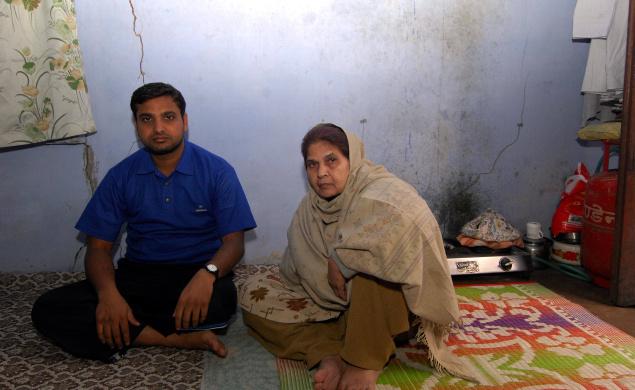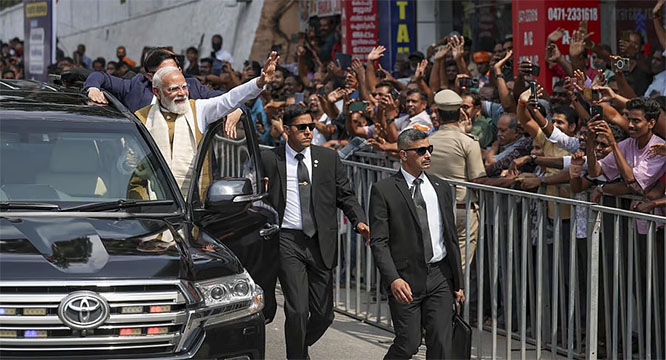The incredible story of boy ‘terrorist' Mohammad Aamir whose youth was destroyed because of his wrongful arrest and 14-year long incarceration
Mohammad Aamir had just turned 18, when one February day in 1998, he was ambushed by a police van. A month later, he found himself thrown against the cold, forbidding walls of a prison cell in the capital's Tihar jail. The charges were murder, terrorism and waging war against the nation.

Mohammed Aamir and his mother at their home in New Delhi
Aamir, released in January this year after 14 years, was named the main accused in 20 low-intensity bomb blasts executed over 10 months — between December 1996 and October 1997 — in Delhi, Rohtak, Sonepat and Ghaziabad. The blasts led to five deaths in all. Five explosions were on moving buses, 10 occurred in the month of October 1997, five of these during a single evening in places as wide apart as Sadar Bazar in Delhi and Ghaziabad, many miles away. The Ghaziabad blasts were reported from three different coaches of the Frontier Mail.
Aamir and his co-accused Shakeel were charged with physically planting the bombs. Curiously, Shakeel, Aamir's main prop, was discharged before the start of hearing in 10 of the cases. More curiously, in 2009, he was found hanging from the ceiling of his barrack in Dasna Jail. In a further twist, then Jail Superintendent V.K. Singh was charged with Shakeel's murder.
Aamir's is an extraordinary story. His counsel and well-known criminal lawyer N.D. Pancholi says he has not seen a case like this in his career of 35 years: “It is incredible that a young boy of 18 has been named the mastermind and executor in 20 bomb blast cases on the thinnest of evidence. The case reinforces the demand for urgent police reforms.”
Isolation and release
As the charges piled up, Aamir , who was always Aamir to family and friends, acquired a bewildering array of aliases, becoming known in police and court records as Accused no 1, Md. Aamir Khan@ Kamran @Imran@ AbuAkasa @ Arif @Umer. Over the following 14 years, the darkness and isolation of Aamir's solitary high-security cell became his world even as the world outside changed unrecognisably: the capital grew flyovers and got shiny new malls and the metro. His father, in financial ruin and broken from failing to free his only son, died without Aamir knowing about it. His mother, struck down by a brain haemorrhage, lost her voice and became paralytic.
When Aamir, now 32, finally walked free, he had been acquitted in 18 of the 20 terror cases — an astonishing acknowledgement of the lack of evidence against him. Indeed without a single witness in any of the cases connecting him to the blasts, the trial court — which acquitted him in 17 cases — came up with the same line on each judgment day: “there is absolutely no incriminating evidence against the accused.” The Delhi High Court which overturned one of the three cases that went into appeal said: “the prosecution has miserably failed to adduce any evidence to connect the accused appellant with the charges framed, much less prove them.”
The trend points strongly to acquittal in the two remaining cases. In any event, there is the tragic irony of Aamir having already served more than the maximum prison term of 10 years for offences made out in each case. The first thing he did upon being released was to look up at the night sky which he had last seen as a teenager. A month after his return, his story, broken by Mohammad Ali in twocircles.net , appeared in the Urdu press. And Aamir got his revenge: he dropped copies of the papers in the homes of relatives and friends who had imposed a social boycott on the family.
For all his joy in the small things of life, including his reunion with a mother who, not being able to speak, expresses emotions through her eyes, Aamir cannot forget the nightmare of his past which began on February 20, 1998 with him being picked up and driven blindfolded to a distant getaway. A week of intense “questioning” followed by “confessions” and countless signed documents later, he was formally arrested and taken into police remand. The chargesheet filed in April 1998, said Aamir had been trained in Pakistan by the dreaded Abdul Karim ‘Tunda' gang. Further that Aamir and co-accused Shakeel collaborated to make bombs out of a factory rented by Shakil in Pilakhua in Ghaziabad. These were the bombs used in every one of the 1996-1997 blasts.
Aamir's third-floor home, described in the chargesheet as a hideout frequented by Pakistani and Bangladeshi terrorists, is a tiny 10 ft by 4 ft room in a bustling, crowded neighbourhood in Azad Market in Old Delhi.
The police story is that the hideout was visited on February 27, 1998, by two Bangladeshi terrorists. But instead of meeting Aamir there, they chose to wait six hours for him at a railway track off Sadar Bazar. The police party nabbed the two men and, through them, caught up with Aamir and Shakeel.
The seizure memo, questions
According to the seizure memo, a search of Aamir revealed a Webley & Scott revolver with several live cartridges, currency notes (in American dollars), five diaries containing details of explosive materials sourced from various suppliers, and a passport stamped with a single visa entry: to Pakistan. Shakeel carried a bag which had iron pieces, chemicals and other explosive materials.
Other wonders emerged from Aamir's briefcase: his ration card, birth certificate, school character certificate, school identity card besides fifth and seventh standard marksheets. In their “disclosure” statements, Aamir and Shakeel said that they led the police party to Shakeel's bomb-making factory in Pilakhua, from where chemicals and explosives used in the blasts were recovered.
The police produced no witness to the arrests. And the public witnesses allegedly present during the Pilakhua raid flatly refused to support the prosecution during the trial. Chandra Bhan, the prosecution's star witness, on whose evidence the entire terror case rested, maintained through rigorous cross-questioning that he had never seen Aamir and he was taken to the Chanakyapuri Police Station and made to sign on blank papers. Out of hundreds of witnesses produced by the prosecution in all the cases, only four claimed to have ever seen Aamir and not one of them said he had planted the explosives.
Several questions arise: How could an 18-year-old plant bombs by himself — on moving buses and trains, many of the blasts occurring just minutes apart? On the evening of October 1, 1997, Aamir is alleged to have planted two bombs in adjoining areas in Sadar Bazar and then travelled to Ghaziabad to place bombs in three compartments of the Frontier Mail. Would a boy terrorist trained by ‘Tunda' waste his time on low-intensity blasts? And for what earthly reason would he carry his fifth standard marksheet with him?
Of course, it is equally valid to ask why Aamir was singled out by the police. His story, borne out by his single visa stamp, is that he wanted to visit his sister who is married into a family in Pakistan. When he went to the Pakistan High Commission for his visa, he was approached by two men from the Indian intelligence — a fact he claims he learnt later — who asked him to get some documents from Pakistan in return for a small money reward. Tempted, he agreed but only to renege on the deal. Aamir left for Pakistan on December 12, 1997 and returned on February 13, 1998. A fortnight later he was arrested. Interestingly, Aamir was charged with executing the bomb blasts subsequent to his training in Pakistan. The last of the bomb blasts was in October 1997 — two months before he went on his first and last trip to Pakistan.
Aamir has his own questions: “Madamji,” he asks me, “if at 18, I became a dreaded mastermind with so many aliases, surely I would have been but a child when I started out?” And also, “I spent 14 years in jail for allegedly causing five deaths. What about the policemen who shot dead so many Muslims in cold blood in Hashimpura? What about Gujarat 2002?”







Comments
Add new comment